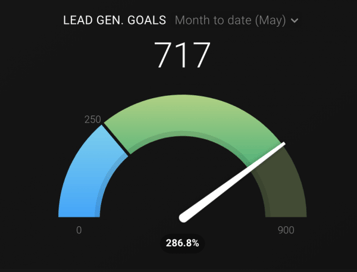

Sometimes, even a well-executed marketing plan fails. When this happens, teams should dissect what went wrong to prevent failure from happening again (or at least the same type of failure). Marketers who simply move on and do not adequately analyze failed campaigns are doomed to repeat the same mistakes.
There are some common reasons that B2B digital marketing plans fail. After an unsuccessful campaign, if the reason is not entirely clear, look at some of the signs for failure below to see if one of these problems occurred.
Unrealistic expectations are a huge reason for failure in marketing campaigns. Executives, stakeholders, or clients may expect a campaign to perform very impractically, and the team may not want to explain they cannot meet such outsized goals. This sets marketers up for failure. Alternatively, the stakeholder may not fully understand the function of marketing or why a campaign is run a certain way. Without full communication, which includes goal setting, a campaign is hopeless from the start.

Goals must also be numeric. Failure is imminent if the goal is to “raise awareness of a brand” and the marketers do not lay out what metrics are needed to attain this goal. Goals cannot be too generic, nor should they be too granular. A huge mistake that marketers make is setting goals based on industry standards.1
Industry standard benchmarks lack context and a sense of the quality of the outcomes being measured. Marketers need to test their current state instead of taking generic industry benchmarks and making goals off on those numbers. Only about 22% of businesses are satisfied with their conversion rates, which may be partly because companies often base conversion rates directly on industry standards.
Download: How to set conversion goals
Improper goal setting can drown an entire marketing campaign. And marketers who launch campaigns without goals are even more likely to fail. In fact, marketers who set goals are 377% more likely to report success than those who don’t. Not only are organized marketers nearly seven times more likely to report success than their peers, but they also have a 414% increase in the likelihood of reporting success when they document their strategies.2 Goals should have context, be based on data, and be reasonable. While well-done marketing campaigns can have powerful results, clients must understand what to expect before the campaign launches so everyone is on the same page.
Most marketing campaigns target a prospect at a certain stage of the sales funnel, often at the top or in the awareness stage. However, 68% of marketers have not defined their funnel, which means they lack an understanding of the buyer journey.

To understand their intent, the marketing team should identify the buyer journey and how they move down the sales funnel. This helps marketers create smarter B2B digital marketing plans. Furthermore, by having knowledge about the buyer in the awareness stage, marketers can make more targeted campaigns that direct them through the buyer journey. Without this information, a campaign has no way to move forward; it’s essentially throwing out information and hoping that buyers like it and take action.
Most critically, marketers must spend time to deeply understand the needs, intentions, and challenges that motivate buyers. Pain points, business value, and institutional aspirations are key components that must be understood and documented. Buyer understanding is a crucial component that drives marketing success.
Marketers need to test, optimize, adapt, and learn continuously. Without this, marketers will have no knowledge to improve campaigns, which means campaigns will likely fail. Marketers with a learning, adaptation, iteration, and optimization process can take the weak points of a B2B digital marketing plan and adjust them in real time.

Look at test variations: compare results and gain top-level insights
Use Submissions & new contacts to gauge performance
Use conversion rates to ultimately determine the impact of tests
Furthermore, there should be a testing process and time period so that marketers know which campaign tactics work and which do not before launching an important campaign. Agile workflow processes, like Scrum or Kanban, are designed to help marketers respond with rapid adjustments from their test data. In fact, the likelihood of success from agile marketers is reported to be 469% greater than that of their peers. Marketers who go into a campaign blind or who cannot quickly respond to buyers are less likely to succeed than those who can test tactics and know what works with what audiences.
Marketers who continually learn and test strategies increase their likelihood of running successful campaigns, as those individuals constantly stay on top of what methods work and what methods are falling out of fashion in the marketing world. Teams that lack dedicated individuals for testing and optimization are likely running poor-performing campaigns as they are not learning from past mistakes. Teams that can learn from failures, however, and take time to realize errors can move forward to find success in their B2B digital marketing plans.
Sources:
1 Econsultancy, Conversion Rate Optimization Report 2017, 2017
2CoSchedule, Trend Report: Marketing Strategy 2022, 2022
3Salesforce, Setting Up for Success With Marketing Automation, accessed 2022
4CoSchedule, Trend Report: Marketing Strategy 2022, 2022
by Jonathan Franchell, CEO of Ironpaper - For more tips and hacks: Need to remove a new line after h1 tags? Both web designers and SEO practitioners need to employ headline tags: H1, H2, H3 in several ways to improve web page structure and tag...

The marketing industry is transforming significantly due to generative AI and increasing market complexity. Gartner's prediction of a 25% decline in traditional search traffic suggests that the era of search engines is dying. AI tools, particularly...

The Crowded Arena of the IT Marketplace Updated December 2024 The Information Technology (IT) landscape is experiencing rapid growth and intensifying competition. IT spending is projected to reach nearly 5.1 trillion U.S. dollars in 2024, a...

Updated December, 2024 The field of digital marketing is evolving rapidly in response to new technology and changing buyer expectations. To help career-minded marketers, we’ve rounded up the top 10 skills needed to succeed in the field. These are...
